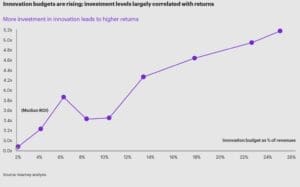
Investments in supply chain firms and technologies represent 15-20% of total venture capital investments, according to a recent report by the management consulting firm Kearney. The supply chain is already an investment priority, but these investments are poised to increase. Following a downturn in VC investing, VC funding is flowing back into startups while strategic buyers are buying young supply chain firms with promising technology. Supply chain technology vendors and technology-based third-party logistics firms received VC investments totaling $15.4 billion in 2024.
“Investing in breakthrough innovation has always been a risky business” the report stated. “Yet Amazon is investing $1 billion into next-gen supply chain technology companies this year, while other supply chain-forward companies like Maersk, UPS, DHL, Walmart and others have also made major acquisitions in recent years.” In fact, the report shows that the more companies invest, the bigger the average ROI. “Quite simply, the more you invest, the better you get at monetizing breakthrough innovation.”
The biggest capital infusions into existing companies occurred in delivery. The Netherlands-based online grocery store Picnic Technology raised €355 million in investor capital as part of plans to expand into France and Germany. Flexport – a logistics service provider whose services include order management, delivery, trade financing, insurance, freight forwarding, and customs brokerage – raised $260 million on an uncapped convertible note from Shopify. Skydio, an intelligent drone technology, received $230 million Series E fundraising. Shadowfax – an Indian logistics service provider serving the ecommerce and pharmaceutical sectors – raised $100 million. 3D printing companies Relativity and Divergent also saw infusions of capital. In Divergent’s case, they raised $230 million.
Venture capitalists were also investing in verticalized supply chain solutions; solutions that enhance visibility and predictability across the supply chain – $1.2 billion had been invested in Exiger; warehouse automation and robotics; supply chain digitization and AI; and supply chain sustainability solutions.
More than 150 supply chain startups have been acquired in the last two years. The acquisitions have mainly come from logistics service providers – who are looking to use cutting-edge technology to improve their services – and technology companies. Over the past few years, technology companies have been lured into bigger investments because of suppressed deal value.
Siemens, the German multinational technology company, acquired Timeseries, Lightworks, and OneSpin to support their Mindsphere industrial software business. The cloud-based Mindsphere platform and applications make production lines more transparent and efficient by providing manufacturers with enhanced insight into the performance and status of their machines, plants, and automation processes.
Bentley Systems – which provides software and services for the design, construction, and operation of infrastructure – bought a range of industrial software start-ups with vertical or focused capabilities in sensors, energy management, and design.
Rockwell Automation, a multinational focused on industrial automation, has placed some bets in warehouse automation. They acquired OTTO Motors and Clearpath Robotics. They also invested in manufacturing software firms like Plex, Oslo, and AVATA.
More recently, BlueYonder, a leading supplier of supply chain software companies, acquired One Network Enterprises for approximately $839 million. OneNetwork’s multi-tier supply chain visibility solution can improve BlueYonder’s planning and execution applications.
The Kearney report is based, in part, on an examination of deals. However, the findings are also based on an in-depth survey of 100 senior operations leaders of large companies in terms of their insights into the acquisitions that are key to securing their companies’ supply chain futures.




















